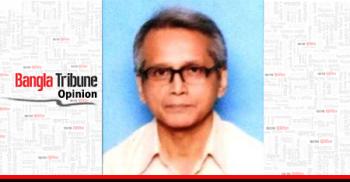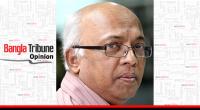 Tasteless remarks about Bangladeshis repeatedly expressed by senior Indian leaders like Amit Shah, president of India’s ruling Bharatiya Janata Party(BJP) and others, may eventually lead to India’s diplomatic isolation in South Asia. Delhi must not take Dhaka’s support for it on major regional issues for granted.
Tasteless remarks about Bangladeshis repeatedly expressed by senior Indian leaders like Amit Shah, president of India’s ruling Bharatiya Janata Party(BJP) and others, may eventually lead to India’s diplomatic isolation in South Asia. Delhi must not take Dhaka’s support for it on major regional issues for granted.
This is the considered opinion of Kolkata and Delhi-based political analysts, who point out that India has no ally in South Asia apart from Bangladesh. Its relations with Nepal and Sri Lanka are ambivalent at best. Following the 2015 economic blockade organised against Nepal from India, China had arranged for emergency supplies of essentials across the difficult northern border. In the process, it has naturally emerged as Nepal’s friend in need.
It may be recalled that owing to the pressure of BJP hardliners, there was a sharp reaction in India when Nepal decided to amend its Constitution in an effort to modernise its Governance. Kathmandu sought to change Nepal’s religious character to ‘secular’ in the amended Constitution, a major change, from ‘Hindu’ in the old version after a newly elected dispensation came to power in 2017. The new prime minister was the Left-wing KP Sharma Oli whose CPN/UML party won with l Maoist support. He was known to be close to China and was elected for the second time. During his earlier stint, there were tensions between the two countries.
People of North Indian origin settled in Nepal (Madhesias in local parlance) agitated against the proposed alteration. The BJP-ruled government did little to check them. Instead, an economic blockade in India by pro-BJP forces targeting Nepal, which sources its essential supplies from India, using the port of Kolkata and the Siliguri corridor, caused much distress to the common people. As supplies ran short, there was a massive price rise that hurt most people in the land-locked country. In areas of Nepal where repair and restoration work was still continuing after the devastating earthquake of 2015, people really faced an agonising situation.
The majority of Nepalis reacted angrily against India’s big brotherly attitude, seeking to nudge their country into adopting a pro-Indian position over an issue that did not really concern Delhi directly. Most Nepali commentators excoriated India for its bullying interference and pressure tactics against a small, geographically handicapped neighbour. Even within India, there was a negative reaction to the blockade among the opposition parties, commentariats and analysts.
As Nepal contacted China for help, Beijing responded positively. Even earlier, offering to strengthen Nepal’s connectivity infrastructure, China had promised an investment of $2.4 billion. Despite its traditional help to Nepal, India could never match such levels of investment. Further, China offered Nepal the use of its port facilities by creating a northern route to reduce its dependence on India.
Sensing the danger of being upstaged in Nepal, the sponsors of the blockade called off their agitation. Later when Oli went to visit India, he was received effusively by Prime Minister Narendra Modi. But Nepalese media reported that Oli chose to remain more guarded in his approach, even as he called for closer Indo-Nepal ties.
Shortly thereafter Nepal refused to participate in the joint BIMSTEC defence drill in Pune, along with Thailand. It sent only an observer, the excuse — prior engagements for the army. But it participated in the new Sagarmatha military exercise with China on a smaller scale. The bitter memories of the blockade were clearly not forgotten.
If India’s pressure tactics offended Nepal, with Bangladesh it has been the recklessly provocative rhetoric of the ruling party that is hurting India’s own regional interests. BJP President Shah, in public meetings and press briefings, has been using the sort of language that would certainly alienate, if not anger, the citizen of a country. He has referred to over the 4 million people whose names do not figure in the Assam citizenship upgrading exercise (NRC) as Ghuspetia (infiltrators). Later, he described illegal Bangladeshi immigrants as ‘termites’ gnawing away at India’s economic fabric.
“The idea is to whip up an anti-migrant sentiment in India. President Trump is doing the same in the US and similar sentiments are emerging in parts of Europe. But why Shah is doing this against Bangladesh, the friendliest country for India, passes all understanding. What is the evidence that Bangladeshis are entering India illegally?” says Kolkata-based analyst Charubrata Ray.
Subir Bhaumik, a political commentator, is shocked. “Has Shah forgotten what Bangladesh has done for India by giving its transit rights, keeping Islamist extremists in check, throwing out secessionist Indian organizations and tightening up the porous border? Bangladesh is ahead of India in several areas in the human development index, where is the need for its people to enter India illegally? Do BJP leaders realise that in attacking secular Bangladesh, they are helping the BNP and Islamist extremists directly? How does it serve our interests if we unnecessarily antagonise our best friend in the region?” he asks.
Other observers offer a different take. They say that Shah and others are making their aggressive anti- minority pitch in view of the coming elections in five states in India.
“Minority bashing leads to consolidation of Hindu votes in many parts of India, which results in uniting majority votes against minority votes combined. It helps the BJP forces of appeasement like the Trinamool Congress, the SP and the BSP etc. It is all pre-election rhetoric, not to be taken seriously. Relations between the ruling BJP and the Awami league could not be more cordial. Proof of this is the restrained reaction coming from senior Bangladeshi ministers and diplomats who maintain that Shah’s position does not reflect India’s official stand on the matter. Also, it is common knowledge that Sheikh Hasina and Narendra Modi enjoy an excellent rapport. Modi fully understands the significance and value of closer ties with Bangladesh. That is why Dhaka is not too worried over Shah’s comments,” says an observer.
One can only hope this version of the matter is correct for the sake of better Indo-Bangladesh relations.
Ashis Biswas is a Kolkata-based journalist. During his long career, he has worked for the Hindustan Times, Ananda Bazar Patrika, The Hindu and the Outlook magazine. He has been based in New Delhi, Kolkata and the Northeast and worked in West Asia as well.
 Opinion
Opinion
30888 hour(s) 19 minute(s) ago ;
Evening 07:13 ; Thursday ; Apr 25, 2024
India's unfair tirade against Bangladesh puzzles Indians too
Send
Ashis Biswas
Published : 17:36, Oct 14, 2018 | Updated : 18:36, Oct 14, 2018
Published : 17:36, Oct 14, 2018 | Updated : 18:36, Oct 14, 2018
0 ...0 ...
/zmi/
***The opinions, beliefs and viewpoints expressed in this article are those of the author and do not reflect the opinions and views of Bangla Tribune.
- KOICA donates medical supplies to BSMMU
- 5 more flights to take back British nationals to London
- Covid19: Rajarbagh, Mohammadpur worst affected
- Momen joins UN solidarity song over COVID-19 combat
- Covid-19: OIC to hold special meeting
- WFP begins food distribution in Cox’s Bazar
- WFP begins food distribution in Cox’s Bazar
- 290 return home to Australia
- Third charter flight for US citizens to return home
- Dhaka proposes to postpone D8 Summit
Unauthorized use of news, image, information, etc published by Bangla Tribune is punishable by copyright law. Appropriate legal steps will be taken by the management against any person or body that infringes those laws.
Bangla Tribune is one of the most revered online newspapers in Bangladesh, due to its reputation of neutral coverage and incisive analysis.
F R Tower, 8/C Panthapath, Shukrabad, Dhaka-1207 | Phone: 58151324; 58151326, Fax: 58151329 | Mob: 01730794527, 01730794528


